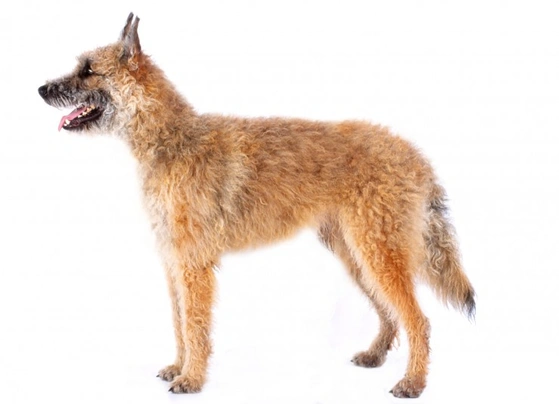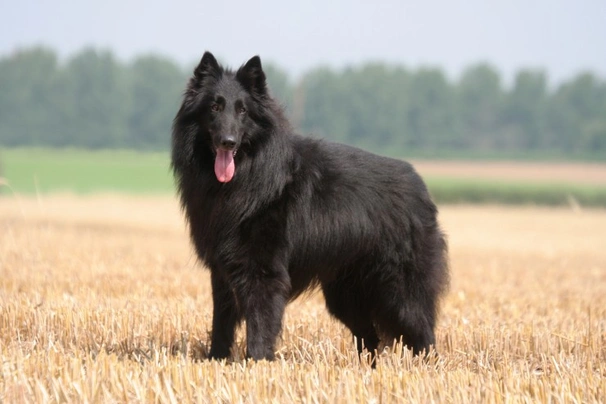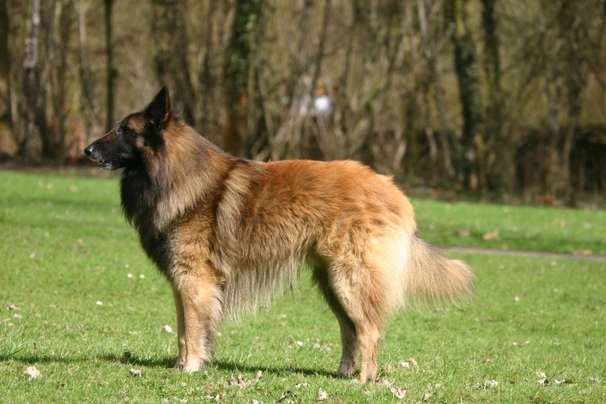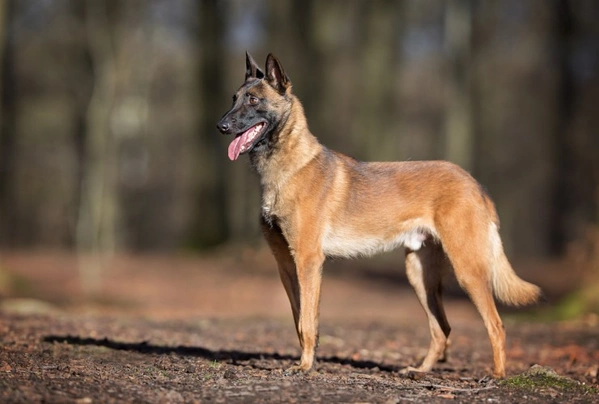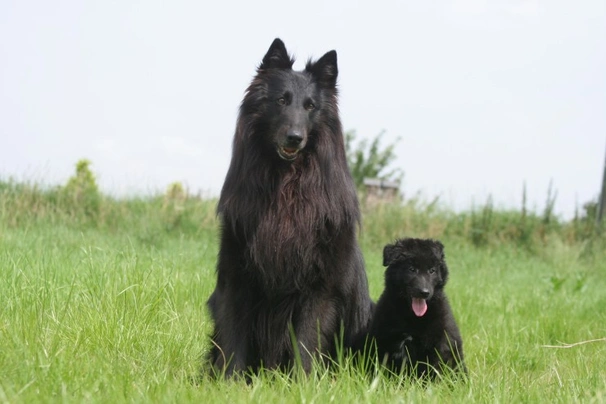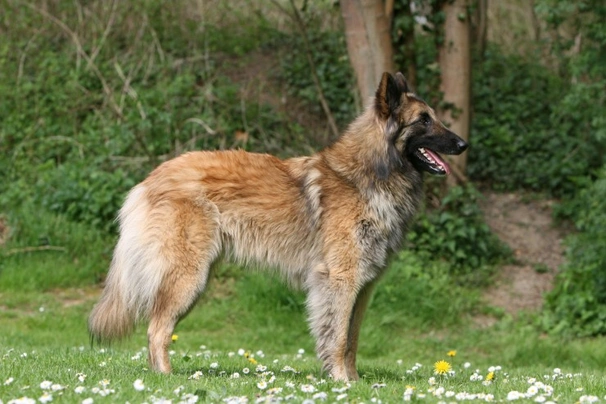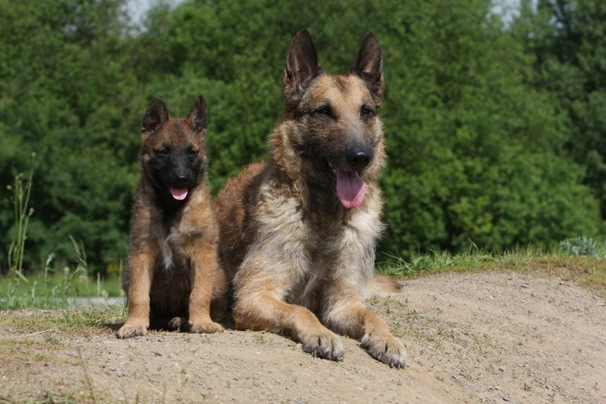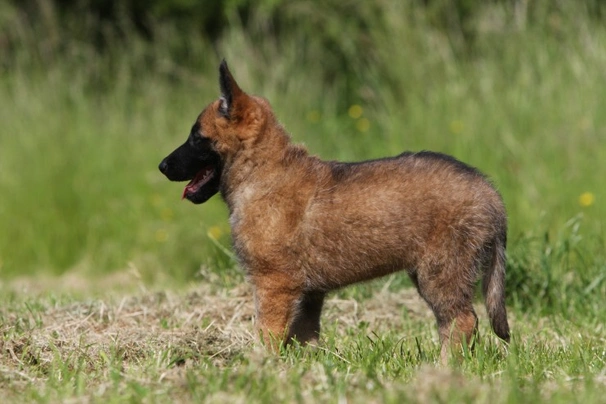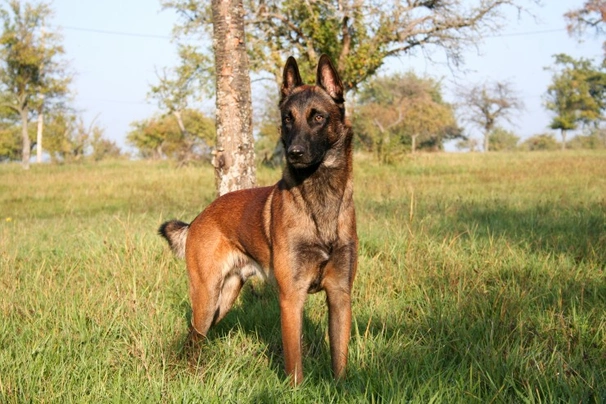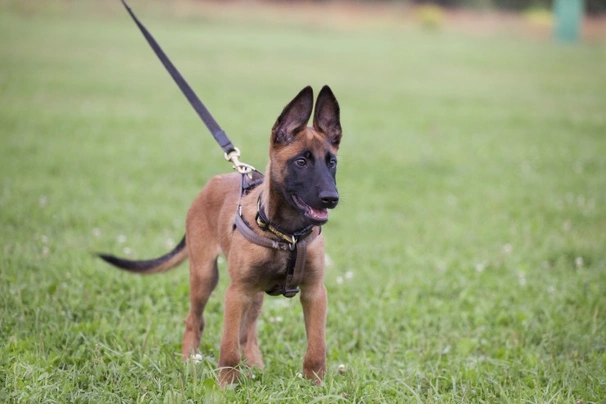Belgian Shepherd Dog
Pros
Cons
Introduction of the Belgian Shepherd Dog
The Belgian Shepherd as their name suggests is native to Belgium where they were originally bred as working dogs. There are in fact four varieties of the breed with each of them being named after the regions of the country they were first bred. These are the Tervueren Groenendael Malinois and Laekenois. They are an ancient breed and one that has always been highly prized in their native Belgium but over recent times the Belgian Shepherd has become more well known in other parts of the world which includes here in the UK thanks to their handsome looks and their loyal kind natures.
BSDs are extremely intelligent and they are also known to be very sensitive to all that goes on in their environment. They form strong ties with their families and owners which makes them great family pets and companions. With this said because they are so smart Belgian Shepherd Dogs must be well socialised trained and handled correctly from a young age as a way of avoiding any unwanted and dominant behaviours. BSDs excel at all sorts of canine activities and are highly prized as assistance and search and rescue dogs.
History of the Belgian Shepherd Dog
As previously mentioned the Belgian Shepherd is thought to be an ancient breed that dates back to the Middle Ages. The breed was developed in the late 1800's in Belgium with four varieties being created in different regions of the country. The Groenendael is credited to having been developed by a restaurant owner the Tervueren was developed by a Belgian brewer the Malinois is so named after the region they were first developed and lastly the Laekenois was bred in Boom a region where the royal residence of Queen Marie Henriette is located who was an enthusiast of this particular type of Belgian Shepherd Dog.
A Belgian breed club was set up late in the 1800's and by 1891 the four varieties of Belgian Shepherds were given their own breed standards which were established by a Belgian vet by the name of Professor Adolphe Reul. These handsome dogs remained popular for many years and they were even used during World War I and II to carry messages to and from the front as well as to pull ambulances and machine gun carts.
Over time the breed has become more well known in other parts of the world including here in the UK. However all four varieties of the Belgian Shepherd Dog are classed as a single breed by The Kennel Club although other clubs around the world tend to class them as separate breeds and this includes the American Kennel Club.
Interesting facts about the breed
- There are 4 varieties of the Belgian Shepherd dog namely the Tervueren the Groenendael the Malinois and the Laekenois
- They have always been highly prized assistance and search & rescue dogs thanks to their intelligence stamina and tracking abilities
- They excel at many canine sports
- BSDs are natural watchdogs and do not need to be trained to "protect"
- Groenendaels are often softer natured than their other counterparts
Appearance of the Belgian Shepherd Dog
Height at the withers: Males 60 - 66 cm Females 56 - 62 cm
Average weight: Males 25 - 30 kg Females 20 - 25 kg
The Belgian Shepherd is a medium sized dog and there are 4 varieties of them with the Groenendael having long hair the Laekenois has a wiry short reddish/fawn colour the Malinois has a shortish coarse coat and lastly the Tervueren has a thicker longer and straight coat than the Malinois although both varieties have the same coat colours. Other than the difference in their coats and coat colours all four varieties are similar in build and appearance.
Their heads are long finely chiseled and quite wide with dogs having flat foreheads and a nice centre line and moderate stop. Muzzles are moderately long and taper gradually to a black nose that boasts flared nostrils. Eyes are medium in size and slightly almond-shaped being dark brown with black rims. Belgian Shepherd Dogs have an enquiring alert look about their eyes which is typical of the breed.
Ears are triangular shaped and set high which dogs hold erect. They have firm mouths with well pigmented lips and strong jaws with a perfect scissor bite where their upper teeth neatly overlap their lower ones. Their necks are supple and slightly elongated being well-muscled and gradually getting broader at a dog's shoulders with the nape being slightly arched. Their withers are well-defined with dogs having powerful forequarters and long oblique shoulder blades. Front legs are well-muscled straight and strong with dewclaws being allowed under the breed standard.
Belgian Shepherds have very powerful yet elegant bodies with deep well-let down chests and moderately well sprung ribs. Their upper bodies are broad well-muscled and straight. Their rumps slope slightly and are quite broad. Hindquarters are powerful well-muscled with dogs having strong straight back legs. They have well arched close tight toes and thick springy soles to their feet with large dark coloured nails. Their front feet are round whereas their back ones are slightly oval shaped. Tails are set firmly at the base and are moderately long which dogs let hang down when relaxed with the tip ever so slightly raised whereas when excited or alert dogs carry their tails higher.
When it comes to their coats Belgian Shepherd Dogs come in four varieties which are as follows:
The Groenendael - their outer coat is straight long and profuse being quite harsh to the touch. The undercoat is very dense. The hair on a dog's head the outside of their ears and lower part of their legs is shorter but the opening of a dog's ear is well protected by hair. The hair around a dog's neck is profuse and long especially in males. There is a fringe of longer hair on the back of a dog's front legs and an abundance of long hair on their hindquarters and tales with males having a longer coat than their female counterparts.
The Tervueren - their outer coat is straight long and profuse being quite harsh to the touch. The undercoat is very dense. The hair on a dog's head the outside of their ears and lower part of their legs is shorter but the opening of a dog's ear is well protected by hair. The hair around a dog's neck is profuse and long especially in males. There is a fringe of longer hair on the back of a dog's front legs and an abundance of long hair on their hindquarters and tales with males having a longer coat than their female counterparts.
The Laekenois - their coat is harsh and wiry with hair being around 6 cm long all over a dog's body. However the hair around their eyes and on their muzzles should not obscure a dog's vision or the lines of their noses. The Laekenois does not have a plumed tail.
The Malinois - the hair on a dog's head the exterior of their ears and lower parts of their legs is very short. It is also short on the rest of their body although thicker on the tail and around a dog's neck so that it looks like a collar that reaches from the base of the ear to a dog's throat. Their hindquarters boast having fringes of longer hair and their tails are bushy and thick. Their coats are close thick and firm to the touch with dog's boasting a woolly and softer undercoat.
Gait/movement
When a Belgian Shepherd Dog moves they do so with great drive and purpose showing a free and brisk as well as even gait. BSDs always give the impression of being alert and move with athletic vigour when trotting or galloping.
Faults
The Kennel Club frowns on any sort of exaggeration or departure from the breed standard and would judge any faults on how much they affect a dog's overall health and wellbeing as well as their ability to work.
Males should have both testicles fully descended into their scrotums and BSDs can be a little taller or shorter as well as slightly heavier or lighter than stated in their Kennel Club breed standard which is given as a guideline only.
Temperament of the Belgian Shepherd Dog
Belgian Shepherds were bred as working dogs and they excel at their jobs whether it's herding or guarding flocks. It's important for these intelligent and energetic dogs to be kept busy when they live in a home environment. They are not the best choice for people who lead more sedentary lives nor are they an ideal choice for first time owners because they need to be well socialised and trained by people who are familiar with the breed or similar type of working dog.
They are very intelligent and as such they are quick to pick new things up which includes both the good and the bad. Puppies need to be very well socialised as soon as they are fully vaccinated and this must include introducing them to new situations noises people other dogs small animals and pets so they grow up to be well-rounded mature dogs no matter what situation they find themselves in.
If left to their own devices or not given sufficient mental stimulation and daily exercise a Belgian Shepherd would soon get bored which can lead to dogs developing a lot of behavioural issues which includes being destructive around the home. They like nothing better than to be with people and are never happy when left on their own for any length of time which makes them a good choice for people where one person usually stays at home when everyone else is out. Belgian Shepherds like being involved in everything that goes on in a household.
They tend to be quite aloof and wary when they are around strangers but rarely would a Belgium Shepherd show any sort of aggressive behaviour towards people they do not know preferring to keep their distance until they get to know them bearing in mind that BSDs are known to be natural watchdogs that don't need to be trained to "protect" which could lead to dogs becoming too dominant and aggressive.
Are they a good choice for first time owners?
Belgian Shepherd Dogs are better suited to people who are familiar with their specific needs rather than first time dog owners. BSDs being so intelligent are quick to learn new things and this includes the good and the bad. Everything they do is done with a tremendous amount of enthusiasm and they thrive in a home or working environment. In short they do a lot better when living with people who lead active outdoor lives and who like to have a clever energetic and enthusiastic canine companion at their side.
What about prey drive?
Belgian Shepherds have a high prey drive and will give chase to any animal that tries to run away. As such great care should always be taken when walking a dog off the lead in areas where there are any farm animals or wildlife.
What about playfulness?
Belgian Shepherd Dogs have a playful side to their natures and love being entertained and entertaining their owners but they can be mischievous when the mood takes them too. They thrive on playing interactive games which includes things like flyball agility tracking and obedience to name but three. They are also known to be a little mischievous when the mood takes them and being so clever a BSD will always test the limits and boundaries that have been set for them more especially when they are puppies.
What about adaptability?
Being such active high-energy and intelligent dogs BSDs are better suited to households with gardens where a dog can run free as often as possible in a safe and secure environment. They are not well suited to apartment living although if given enough vigorous daily exercise and a ton of mental stimulation a BSD is quite happy to relax once they get home.
What about separation anxiety?
Belgian Shepherds form strong ties with their families and dogs are never very happy when they find themselves left on their own for longer periods of time. They are better suited to people who either work from home or in households where one person stays at home when everyone else is out so they are never alone for any length of time which could see a dog suffering from separation anxiety. This can lead to them being destructive around the home which is a dog's way of relieving any stress they are feeling and a way to keep themselves entertained bearing in mind that BSDs have a very low boredom threshold.
What about excessive barking?
Some BSDs like the sound of their own voices which is something that needs to be gently nipped in the bud when a dog is still young being careful not to frighten them. Others will only bark when there are strangers about or when something they don't like is going on in their surroundings bearing in mind that the Belgian Shepherd is a natural watchdog and will instinctively protect their families and properties.
Do Belgian Shepherds like water?
Most BSDs like swimming and will take to the water whenever they can more especially when the weather is hot. However anyone who owns a dog that does not like water should never force them in because the experience would just end up frightening them. With this said care should always be taken when walking a Belgian Shepherd off the lead anywhere near more dangerous watercourses just in case a dog decides to leap in and then needs rescuing.
Are Belgian Shepherds good watchdogs?
As previously mentioned Belgian Shepherd Dogs are natural watchdogs and therefore always ready to protect their families and their possessions. As such it would be a mistake to "train" a BSD to guard which could end up making a dog aggressive and harder to manage when people they don't know are around. It is also worth noting that BSDs are extremely sensitive to their surroundings and being always so alert they are quick off the mark when it comes to letting an owner know they are unhappy about something.
Intelligence / Trainability of the Belgian Shepherd Dog
Belgian Shepherds are intelligent dogs and as previously mentioned they learn new things very quickly which includes the good and the bad. Puppies need to be well socialised from a young age and their training must start in earnest as soon as they have been fully vaccinated for them to grow up to be well-rounded obedient mature dogs. It is always a good idea to enroll a BSD into puppy socialisation classes which is a great way to start their education in a safe and secure environment once they are fully vaccinated.
They are very sensitive to everything that goes on in their environment which is one of the reasons they learn new things so quickly. They respond well to clicker training and positive reinforcement training which always brings the best out of a BSD. Harsh treatment or correction must be avoided because a BSD is so sensitive and it would just have an adverse effect on a dog which could even lead to them showing some aggressive behaviour.
Because Belgian Shepherds have a very strong instinct to protect as previously mentioned this is one of the breed’s traits that should not be encouraged when dogs are young because they might start protecting a family when it's not necessary which could lead to things becoming awkward when visitors are in the home or when dogs find themselves in situations where they believe a family needs protection.
BSD puppies must be well socialised and handled correctly from a young age so they understand what is expected of them. The first commands a puppy should be taught are as follows:
- Come
- Sit
- Stay
- Quiet
- Leave it
- Down
- Bed
Children and other
Belgian Shepherds are known to become devoted to their families showing a lot of affection to everyone in a household which includes children. They love nothing more than being involved in things that go on in a home environment and this includes playing lots of interactive games with the kids. However any interaction between dogs and children should always be supervised by an adult to make sure playtime does not get too rough which is especially true if the kids have any of the friends over.
If a well-bred and nicely-socialised Belgian Shepherd grows up with other animals and pets including cats in the home they generally get on well together. Some dogs may show aggression to other dogs which is why it's so important for puppies to be well socialised from a young age which must include them meeting other dogs once they have been fully vaccinated. Care should always be taken when a BSD is around any smaller animals and pets they don't already know just to be on the safe side.
Health of the Belgian Shepherd Dog
The average life expectancy of a Belgian Shepherd Dog is between 10 and 14 years when properly cared for and fed an appropriate good quality diet to suit their ages.
Like so many other breeds the Belgian Shepherd is known to suffer from a few hereditary health issues which are worth knowing about if you are planning share your home with one of these active and handsome dogs. The conditions that seem to affect the breed the most include the following:
- Hip dysplasia - DNA test available through BVA/KC scheme for all 4 varieties
- Eye issues - Test available through BVA/KC scheme for all 4 varieties
- Epilepsy
- Sensitivity to anaesthetic and some immunisations
- Dermatitis - more especially when shedding
- Bloat
What about vaccinations?
BSD puppies would have been given their initial vaccinations before being sold but it is up to their new owners to make sure they have their follow-up shots in a timely manner with the vaccination schedule for puppies being as follows:
- 10 -12 weeks old bearing in mind that a puppy would not have full protection straight away but would be fully protected 2 weeks after they have had their second vaccination
There has been a lot of discussion about the need for dogs to have boosters. As such it's best to talk to a vet before making a final decision on whether a dog should continue to have annual vaccinations which are known as boosters.
What about spaying and neutering?
These days a lot of vets recommend waiting until dogs are slightly older before spaying and neutering them which means they are more mature before undergoing the procedures. As such they advise neutering males and spaying females when they are between the ages of 6 to 9 months old. Other vets recommend spaying and neutering dogs when they are 6 months old but never any earlier unless for medical reasons.
What about obesity problems?
Some Belgian Shepherds gain weight after they have been spayed or neutered and it's important to keep an eye on a dog's waistline just in case they do. If a dog starts to put on weight it's important to adjust their daily calorie intake and to up the amount of exercise they are given. Older BSDs too are more prone to gaining weight and again it's essential they be fed and exercised accordingly because obesity can shorten a dog's life by several years. The reason being that it puts a lot of extra strain on a dog's internal organs including the heart.
What about allergies?
BSDs are prone to suffering from allergies and dermatitis more especially during the spring and the autumn when they shed the most hair. As such it's important for a dog to see a vet sooner rather than later if one flares up. Allergies can be notoriously hard to clear up and finding the triggers can be challenging. With this said a vet would be able to make a dog with an allergy more comfortable while they try to find out the triggers which could include the following:
- Certain foods which includes wheat and other cereals
- Airborne pollens
- Dust mites
- Environment
- Flea and tick bites
- Chemicals found in everyday household cleaning products
Participating in health schemes
All responsible Belgian Shepherd breeders would ensure that their stud dogs are tested for known hereditary and congenital health issues known to affect the breed by using the following schemes:
- For the Tervueren - Hip and Eye test through BVA/KC scheme
- For the Groenendael - Hip and Eye test through BVA/KC scheme
- For the Malinois - Hip and Eye test through BVA/KC scheme
- Laekenois - Hip and Eye test through BVA/KC scheme
What about breed specific breeding restrictions?
Apart from the standard breeding restrictions for all Kennel Club registered breeds Malinois Belgian Shepherds can produce Tervueren puppies in a litter and the option to register them as such with the Kennel Club is available providing a letter accompanying the form is submitted at the same time.
What about Assured Breeder Requirements?
It is mandatory for all Kennel Club Assured Breeders to use the following tests on their stud dogs and the KC strongly advises that all other breeders follow suit:
Caring for the Belgian Shepherd Dog
As with any other breed Belgian Shepherds need to be groomed on a regular basis to make sure their coats and skin are kept in tip-top condition. They also need to be given regular daily exercise to ensure they remain fit and healthy. On top of this they need to be fed good quality food that meets all their nutritional needs throughout their lives.
Caring for an Belgian Shepherd puppy
Belgian Shepherd puppies are boisterous and full of life which means it's essential for homes and gardens to be puppy-proofed well in advance of their arrival. A responsible breeder would have socialised their puppies right from when they are born which always leads to more outgoing confident and friendly dogs right from the word go. With this said any puppy is going to feel vulnerable when they leave their mother and littermates which must be taken into account. The longer a puppy can remain with their mother the better although it should never be for too long either.
It's best to arrange to pick puppy up when people in the home are going to be around for the first week or so which is the time needed for a puppy to settle in. Puppy-proofing the home and garden means putting away any tools and other implements that a boisterous puppy might injure themselves on. Electric wires and cables must be put out of their reach because puppies love chewing on things. Toxic plants should be removed from flowerbeds and the home too.
Puppies need to sleep a lot to grow and develop as they should which means setting up a quiet area that's not too out of the way means they can retreat to it when they want to nap and it's important not to disturb them when they are sleeping. It's also a good idea to keep "playtime" nice and calm inside the house and to have a more active "playtime" outside in the garden which means puppies quickly learn to be less boisterous when they are inside.
The documentation a breeder provides for a puppy must have all the details of their worming date and the product used as well as the information relating to their microchip. It is essential for puppies to be wormed again keeping to a schedule which is as follows:
- Puppies should be wormed at 6 months old
- They need to be wormed again when they are 8 months old
- Puppies should be wormed when they are 10 months old
- They need to be wormed when they are 12 months old
Things you'll need for your puppy
There are certain items that new owners need to already have in the home prior to bringing a new puppy home. It's often a good idea to restrict how much space a puppy plays in more especially when you can't keep an eye on what they get up to bearing in mind that puppies are often quite boisterous which means investing in puppy gates or a large enough playpen that allows a BSD puppy the room to express themselves while keeping them safe too. The items needed are therefore as follows:
- Good quality puppy or baby gates to fit on doors
- A good well-made playpen that's large enough for a puppy to play in so they can really express themselves as puppies like to do
- Lots of well-made toys which must include good quality chews suitable for puppies to gnaw on bearing in mind that a puppy will start teething anything from when they are 3 to 8 months old
- Good quality feed and water bowls which ideally should be ceramic rather than plastic or metal
- A grooming glove
- A slicker brush or soft bristle brush
- Dog specific toothpaste and a toothbrush
- Scissors with rounded ends
- Nail clippers
- Puppy shampoo and conditioner which must be specifically formulated for use on dogs
- A well-made dog collar or harness
- A couple of strong dog leads
- A well-made dog bed that's not too small or too big
- A well-made dog crate for use in the car and in the home that's large enough for a puppy to move around in
- Baby blankets to put in your puppy's crate and in their beds for when they want to nap or go to sleep at night
Keeping the noise down
All puppies are sensitive to noise including Belgian Shepherd puppies. It's important to keep the noise levels down when a new puppy arrives in the home. TVs and music should not be played too loud which could end up stressing a small puppy out.
Keeping vet appointments
As previously mentioned BSD puppies would have been given their first vaccinations by the breeders but they must have their follow up shots which is up to their new owners to organise. The vaccination schedule for puppies is as follows:
- 10 -12 weeks old bearing in mind that a puppy would not have full protection straight away but would only be fully protected 2 weeks after they have had their second vaccination
When it comes to boosters it's best to discuss these with a vet because there is a lot of debate about whether a dog really needs them after a certain time. However if a dog ever needed to go into kennels their vaccinations would need to be
What about older Belgian Shepherds when they reach their senior years?
Older BSDs need lots of special care because as they reach their golden years they are more at risk of developing certain health concerns. Physically an older dog's muzzle and the hair on their heads start to go a bit grey but there will be other noticeable changes too which includes the following:
- Coats become coarser
- A loss of muscle tone
- BSDs can either become overweight or underweight
- They have reduced strength and stamina
- Older dogs have difficulty regulating their body temperature
- They often develop arthritis
- Immune systems do not work as efficiently as they once did which means dogs are more susceptible to infections
Older dogs change mentally too which means their response time tends to be slower as such they develop the following:
- They respond less to external stimuli due to impaired vision or hearing
- They tend to be a little pickier about their food
- They have a lower pain threshold
- Become intolerant of any change
- Often an older dog can feel disorientated
Living with a Belgian Shepherd in their golden years means taking on a few more responsibilities but these are easily managed and should include taking a look at their diet the amount of exercise they are given how often their dog beds need changing and keeping an eye on the condition of their teeth.
Older BSDs need to be fed a good quality diet that meets their needs at this stage of their lives all the while keeping a close eye on a dog's weight. A rough feeding guide for older dogs is as follows bearing in mind they should be fed highly digestible food that does not contain any additives:
- Protein content should be anything from 14 – 21%
- Fat content should be less than 10%
- Fibre content should be less than 4%
- Calcium content should be 0.5 – 0.8%
- Phosphorous content should be 0.4 – 0.7%
- Sodium content should be 0.2 – 0.4%
Older Belgian Shepherds don't need to be given the same amount of daily exercise as a younger dog but they still need the right amount of physical activity to maintain muscle tone and to prevent a dog from putting on too much weight. All dogs need access to fresh clean water and this is especially true of older dogs when they reach their golden years because they are more at risk of developing kidney disorders.
Grooming of the Belgian Shepherd Dog
Whether a Groenendael Malinois Tervueren or Laekenois Belgian Shepherds are quite high maintenance when it comes to keeping their coats looking tidy and in good condition thanks to the fact they boast quite profuse undercoats. As such a weekly brush is essential although during the Spring and then again in the Autumn more frequent brushing would be necessary because dogs tend to shed more at these times of the year. The good news is that their coats do not need to be trimmed unless a dog gets messy around their back-ends when a little trimming might be necessary. Care also needs to be taken when choosing any sort of dog shampoo or other canine products typically used on a dog’s coat because Belgian Shepherds are prone to developing dermatitis.
It's also important to check a dog's ears on a regular basis and to clean them when necessary. If too much wax is allowed to build up in a dog's ears it can lead to a painful infection which can be hard to clear up. In short prevention is often easier than cure when it comes to ear infections.
Exercise of the Belgian Shepherd Dog
Being high-energy and intelligent dogs Belgian Shepherd Dogs need to be given the right amount of vigorous daily exercise and mental stimulation for them to be truly happy well-rounded characters. They need to be given at least 60 to 80 minutes exercise every day which should include lots of interactive games. Ideally these dogs need a lot more in the way of mental stimulation than many other breeds and the best way of satisfying their needs is to enroll a dog into agility or obedience classes.
A shorter walk in the morning would be fine but a longer more interesting one in the afternoon is a must. These dogs also like to be able to roam around a back garden as often as possible so they can really let off steam. However the fencing has to be extremely secure to keep these active high-energy dogs in because if they find a weakness in the fence they will soon escape out and get into all sorts of trouble.
With this said Belgian Shepherd puppies should not be over exercised because their joints and bones are still growing and too much pressure on them could result in causing a dog a few problems later on in their lives. They should not be allowed to jump up or off furniture nor should they be allowed to run up and down the stairs.
Feeding of the Belgian Shepherd Dog
If you get a Belgian Shepherd puppy from a breeder they would give you a feeding schedule and it's important to stick to the same routine feeding the same puppy food to avoid any tummy upsets. You can change a puppy's diet but this needs to be done very gradually always making sure they don't develop any digestive upsets and if they do it's best to put them back on their original diet and to discuss things with the vet before attempting to change it again.
Older dogs are not known to be fussy or finicky eaters but this does not mean you can feed them a lower quality diet. It's best to feed a mature dog twice a day once in the morning and then again in the evening making sure it's good quality food that meets all their nutritional requirements. It's also important that dogs be given the right amount of exercise so they burn off any excess calories or they might gain too much weight which can lead to all sorts of health issues. Obesity can shorten a dog's life by several years so it's important to keep an eye on their waistline from the word go.
Because Belgian Shepherd Dogs are prone to suffer from bloat it is really important that they be fed twice a day instead of giving them just one larger meal a day. It's also a good idea to invest in a stand to place their feed bowl which makes it easier for these large dogs to eat comfortably without having to stretch their necks down low to reach their food. Dogs should never be exercised just before or just after they have eaten either because this puts them more a risk of suffering from bloat.
Feeding guide for a Belgian Shepherd puppy
Puppies need to be fed a highly nutritious good quality diet for them to develop and grow as they should. As a rough guide a Belgian Shepherd puppy can be fed the following amounts every day making sure their meals are evenly spread out throughout the day and it's best to feed them 3 or 4 times a day:
- 2 months old - 264g to 274g depending on puppy's build
- 3 months old - 327g to 344g depending on puppy's build
- 4 months old - 354g to 374g depending on puppy's build
- 5 months old - 381g to 413g depending on puppy's build
- 6 months old - 405g to 450g depending on puppy's build
- 7 months old - 403g to 450g depending on puppy's build
- 8 months old - 374g to 419g depending on puppy's build
- 9 months old - 349g to 391g depending on puppy's build
- 10 months old - 318g to 356g depending on puppy's build
- 11 months old - 290g to 323g depending on puppy's build
- 12 months old - 288g to 321g depending on puppy's build
- 13 months old - 286g to 320g depending on puppy's build
- 14 months old - 286g to 318g depending on puppy's build
Once a puppy is 15 months old they can be fed adult dog food.
Feeding guide for an adult Belgian Shepherd Dog
Once fully mature an adult BSD must be fed a good quality diet to ensure their continued good health. As a rough guide an adult Belgian Shepherd Dog can be fed the following amounts every day:
- Dogs weighing 20 kg can be fed 256g to 343g depending on activity
- Dogs weighing 25 kg can be fed 276g to 363g depending on activity
- Dogs weighing 30 kg can be fed 307g to 355g depending on activity
Belgian Shepherd Dog price
If you are looking to buy a Belgian Shepherd you would need to pay anything from £500 to over £650 for a well-bred pedigree puppy. The cost of insuring a male 3-year-old Belgian Shepherd in northern England would be £20.15 a month for basic cover but for a lifetime policy this would set you back £42.09 a month (quote as of September 2017). When insurance companies calculate a pet's premium they factor in several things which includes where you live in the UK and a dog's age and whether they have been neutered or spayed.
When it comes to food costs you need to buy the best quality food whether wet or dry to feed your dog throughout their lives making sure it suits the different stages of their lives. This would set you back between £40 - £50 a month. On top of this you would need to factor in veterinary costs if you want to share your home with a Belgian Shepherd and this includes their initial vaccinations their annual boosters the cost of neutering or spaying your dog when the time is right and their yearly health checks all of which quickly adds up to over a £1000 a year.
As a rough guide the average cost to keep and care for a Belgian Shepherd Dog would be between £70 to £100 a month depending on the level of insurance cover you opt to buy for your dog but this does not include the initial cost of buying a well-bred Kennel Club registered pedigree puppy.
Buying advice
When visiting and buying any puppy or dog there are many important things to consider and questions to ask of the breeder/seller. You can read our generic puppy/dog advice here which includes making sure you see the puppy with its mother and to verify that the dog has been wormed and microchipped.
BSDs are an extremely popular breed both in the UK and elsewhere in the world which means that well-bred puppies command a lot of money. As such with Belgian Shepherd Dogs there is specific advice questions and protocols to follow when buying a puppy which are as follows:
- Beware of online scams and how to avoid them. You may see online and other adverts by scammers showing images of beautiful Belgian Shepherdpuppies for sale at very low prices. However the sellers ask buyers for money up front before agreeing to deliver a puppy to a new home. Potential buyers should never buy a puppy unseen and should never pay a deposit or any other money online to a seller. You should always visit the pet at the sellers home to confirm they are genuine and make a note of their address.
- As previously touched upon Belgian Shepherd Dogs are among the most popular breeds in the UK. As such there are many amateur breeders/people who breed from X far too often so they can make a quick profit without caring for the welfare of the puppies their dam or the breed in general. Under Kennel Club rules a dam can only produce 4 litters and she must be between a certain age to do so. Anyone wishing to buy a BSD puppy should think very carefully about who they purchase their puppy from and should always ask to see the relevant paperwork pertaining to a puppy's lineage their vaccinations and their microchipping
- Prospective owners should always check the lineage of a BSD puppy before purchasing them to make sure that parent dogs are good natured and healthy having been hip scored and eye tested for hip dysplasia and eye disorders the breed is known to suffer from

Cute Belgium puppies
£700
Belgian Malinois X Dutch Herder
£500
